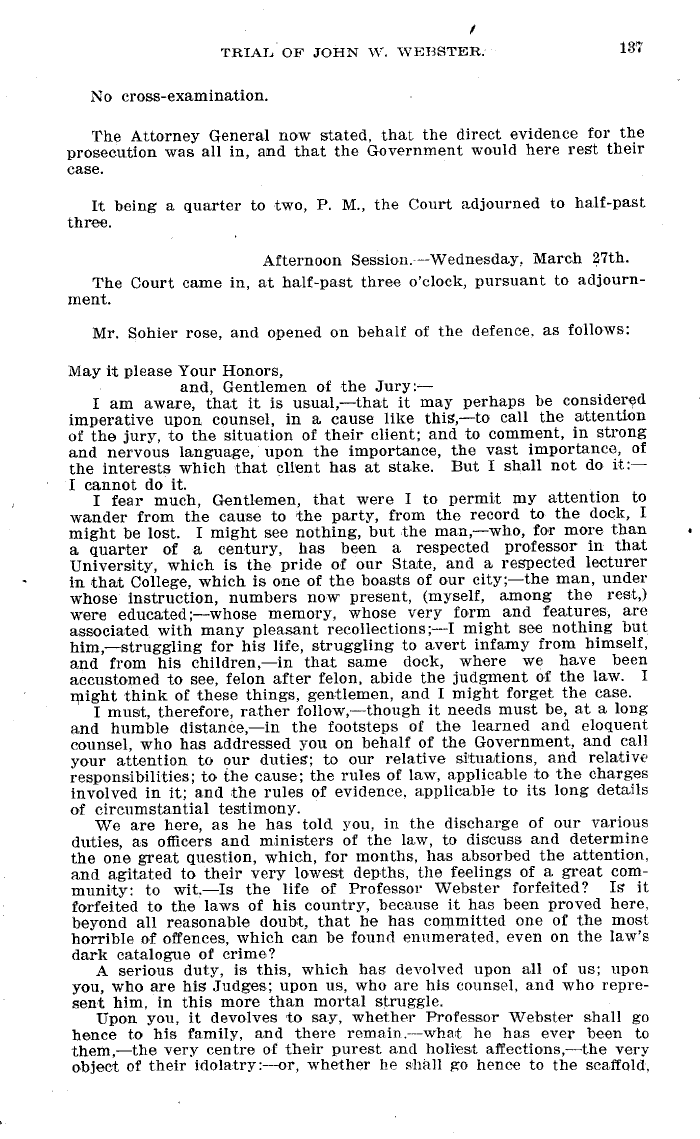|
TRIAL OF JOHN R'. WEBSTER. 137
No cross-examination.
The Attorney General now stated, that the direct evidence for the
prosecution was all in, and that the Government would here rest their
case.
I2 being a quarter to two, P. M., the Court adjourned to half-past
three.
Afternoon Session.---Wednesday, March 27th.
The Court came in, at half-past three o'clock, pursuant to adjourn-
ment.
Mr. Sohier rose, and opened on behalf of the defence, as follows:
May it please Your Honors,
and Gentlemen of the Jury: -
I am aware, that it is usual,-that it may perhaps be considered
imperative upon counsel, in a cause like this,-to call the attention
of the jury, to the situation of their client; and to comment, in strong
and nervous language, upon the importance, the vast importance of
the interests which that client has at stake. But I shall not do it:-
I cannot do it.
I fear much, Gentlemen, that were I to permit my attention to
wander from the cause to the party, from the record to the dock, I
might be lost. I might see nothing, but the man,-who, for more than
a quarter of a century, has been a respected professor in that
University, which is the pride of our State, and a respected lecturer
in .that College, which is one of the boasts of our city; the man, under
whose instruction, numbers now present, (myself, among the rest,)
were educated; whose memory, whose very form and features, are
associated with many pleasant recollections; -I might see nothing but
him,-struggling for his life, struggling to avert infamy from himself,
and from his children,-in that same dock, where we have been
accustomed to see, felon after felon, abide the judgment of the law. I
right think of these things, gentlemen, and I might forget the case.
I must, therefore, rather follow,-though it needs must be, at a long
and humble distance,-in the footsteps of the learned and eloquent
counsel, who has addressed you on behalf of the Government, and call
your attention to our duties; to our relative situations, and relative
responsibilities; to the cause; the rules of law, applicable to the charges
involved in it; and .the rules of evidence, applicable to its long details
of circumstantial testimony.
We are here, as he has told you, in the discharge of our various
duties, as officers and ministers of the law, to discuss and determine
the one great question, which, for months, has absorbed the attention,
and agitated to their very lowest depths, the feelings of a great com-
munity: to wit.-Is the life of Professor Webster forfeited? Is it
forfeited to the laws of his country, because it has been proved here,
beyond all reasonable doubt, that he has committed one of the most
horrible of offences, which can be found enumerated, even on the law's
dark catalogue of crime?
A serious duty, is this, which has devolved upon all of us; upon
you, who are his Judges; upon us, who are his counsel, and who repre-
sent him, in this more than mortal struggle.
Upon you, it devolves 'to say, whether Professor Webster shall go
hence to his family, and there remain.-what he has ever been to
them, the very centre of their purest and holiest affections,-the very
object of their idolatry:-or, whether he shall go hence to the scaffold,
|

